Paris: Former French prime minister Edouard Balladur goes on trial Tuesday on charges that he used kickbacks from arms deals in the 1990s to fund a presidential bid, a case known as the “Karachi affair.”
Balladur, 91, joins a long list of senior French politicians pursued for alleged financial wrongdoing, including former president Nicolas Sarkozy and his predecessor, Jacques Chirac.
The conservative ex-premier will be tried by the Court of Justice of the Republic in Paris, a tribunal dedicated to hearing cases of ministerial misconduct.
Also in the dock will be his former defense minister Francois Leotard, 78, though his presence at the trial’s opening is uncertain because of illness.
Balladur will appear in court Tuesday “to face his judges and answer their questions,” his lawyer Felix de Belloy said.
The two men were charged in 2017 with “complicity in the misuse of corporate assets” over the sale of submarines to Pakistan and frigates to Saudi Arabia between 1993 and 1995, when Balladur was prime minister in the final years of Francois Mitterrand’s presidency.
The kickbacks are estimated at 13 million francs, now worth some 2.8-million-euros ($3.3 million), after accounting for inflation.
The sum is believed to have included a cash injection of about 10 million francs to Balladur’s 1995 unsuccessful presidential campaign against Chirac.
Balladur, who also has to answer to a charge that he concealed the crimes, has denied any wrongdoing, saying the 10 million francs came from the sale of T-shirts and other items at campaign rallies.
The claims came to light during an investigation into a 2002 bombing in Karachi, Pakistan, which targeted a bus transporting French engineers.
Fifteen people were killed, including 11 engineers working on the submarine contract.
The Al-Qaeda terror network was initially suspected of the attack.
But the focus later shifted to the arms deal as investigators considered whether the bombing may have been revenge for Chirac’s decision to halt the commission payments for the arms deals shortly after he beat Balladur in the presidential vote.
Leotard is accused of having created an “opaque network” of intermediaries for the contracts signed with Pakistan and Saudi Arabia.
The ex-premier also stands charged with instructing the budget ministry — led at the time by Sarkozy — to approve state guarantees for “deficient or underfunded” contracts, because of the alleged kickbacks.
Investigators say that cash deposits in Balladur’s campaign fund coincided with trips to Switzerland by Ziad Takieddine, a Lebanese-French intermediary who has long been active in French rightwing circles.
Takieddine fled to Lebanon last June after a Paris court sentenced him and another middleman, Abdul Rahman El-Assir, to five years in prison over their role in the “Karachi” kickbacks.
Balladur’s former campaign manager Nicolas Bazire was given a three-year sentence by the same court, as did Leotard’s adviser Renaud Donnedieu de Vabres.
Thierry Gaubert, an adviser to Sarkozy at the finance ministry, and a former executive at state-owned naval contractor DCN (since renamed Naval Group) got two-year sentences. All have appealed the rulings.
Takieddine told judges in 2013 that he participated in the secret financing of Balladur’s campaign after being asked by Bazire and Gaubert, though he retracted the claim six years later.
In November, Takieddine also took back his claim that he delivered suitcases carrying a total of five-million-euros ($6 million) from Libyan dictator Muammar Qaddafi to Sarkozy’s chief of staff in 2006 and 2007, to help his successful presidential campaign.
Sarkozy has denied the allegations, and investigations into the case are continuing.
French ex-PM Balladur on trial over ‘Karachi affair’ kickbacks
https://arab.news/92r7m
French ex-PM Balladur on trial over ‘Karachi affair’ kickbacks
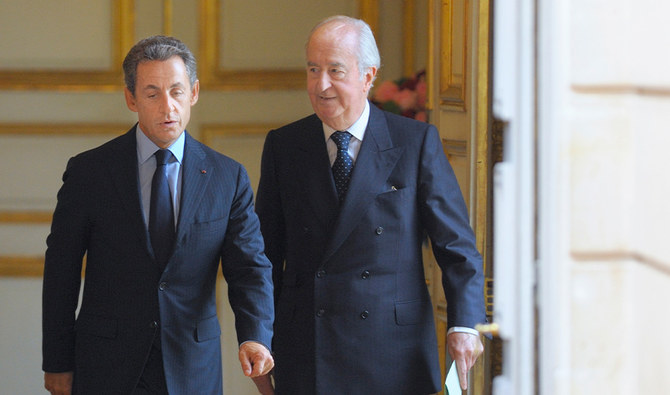
- Balladur was charged in 2017 with "complicity in the misuse of corporate assets" over the sale of submarines to Pakistan
- The kickbacks are estimated at 13 million francs, now worth some $3.3 million, after accounting for inflation
Planning minister says Saudi Arabia to invest $5 billion to boost Pakistan’s economy
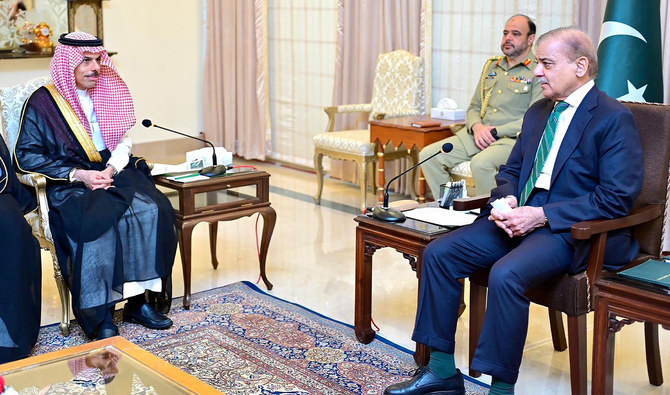
- Ahsan Iqbal says the national economy can reach a $3 trillion mark by 2047 with 9% growth rate
- He informs a summit the government plans to maximize investment from UAE, Kuwait and Qatar
KARACHI: Federal Minister for Planning and Development Ahsan Iqbal announced on Tuesday Saudi Arabia was expected to invest $5 billion in Pakistan, adding the administration in Islamabad was also trying to secure investment from other Gulf states to strengthen the national economy.
Amid economic challenges, Pakistan has been actively trying to attract foreign investment and established the Special Investment Facilitation Council (SIFC), a civil-military hybrid body, last year for the purpose.
The SIFC was created to serve as a single window for all foreign investment activities, offering a simplified and more direct route for international investors interested in various sectors such as mining, agriculture, energy, information technology and defense manufacturing.
The body was tasked to address procedural bottlenecks, accelerate policy reforms and create a more favorable investment climate, with a special focus on Gulf economies.
“Saudi Arabia will soon invest $5 billion in Pakistan and in this regard, Prime Minister Shehbaz Sharif will soon visit Saudi Arabia, followed by an expected visit of the Saudi Crown Prince Mohammed bin Salman to Pakistan,” the Planning Commission of Pakistan quoted the minister as saying in an official statement.
Iqbal issued the statement while speaking at a business summit in Islamabad.
He mentioned that discussions were ongoing with the United Arab Emirates, Kuwait and Qatar to maximize investment in Pakistan.
The planning minister said if Pakistan managed to increase its exports to $100 billion in the next seven to eight years, it would achieve a significant economic takeoff.
He maintained that Pakistan could become a $2 trillion economy by 2047 with 7 percent growth, adding it could also reach a $3 trillion mark by maintaining 9 percent growth.
Pakistan, Saudi Arabia and Uzbekistan ink ‘landmark’ agreement to promote trade, investment

- As per agreement, Uzbekistan’s largest bank and a Pakistani firm will support investors in all three countries
- Partnership to attract foreign investment particularly in key sectors of energy, infrastructure and agriculture
ISLAMABAD: Pakistan, Saudi Arabia and Uzbekistan have signed a “landmark” partnership agreement to boost economic cooperation and create new opportunities for investors in the region, Pakistan’s state-run television reported on Tuesday.
As per the terms of the agreement, Uzbekistan’s largest bank Ansher Capital will work closely with KASB Securities Limited (KASB), a leading Pakistani stock and commodity brokerage firm, to provide financial advisory and corporate finance services to investors in all three countries, the state media said.
Both firms will support investors and traders in Pakistan, Uzbekistan and Saudi Arabia by providing expert guidance on navigating financial markets, the Pakistan Television (PTV) said.
“In a significant development, Uzbekistan, Pakistan, and Saudi Arabia have signed a landmark partnership agreement aimed at promoting investment and trade between the three countries,” PTV said.
“The partnership is expected to expand the market and attract foreign investment, particularly in key sectors such as energy, infrastructure, and agriculture.”
The report said that the agreement is also expected to strengthen trade ties between the three countries, with a focus on increasing trade volumes and promoting economic integration.
“The partnership will enable businesses to tap into new markets and access new investment opportunities, creating jobs and driving economic growth,” PTV said.
Pakistan and Saudi Arabia enjoy strong trade, defense and cultural ties. The Kingdom is home to over 2.7 million Pakistani expatriates and serves as the top destination for remittances to the cash-strapped South Asian country.
Saudi Foreign Minister Prince Faisal bin Farhan arrived in Pakistan last week for a two-day visit aimed at strengthening bilateral economic cooperation and pushing forward previously agreed investment deals. Pakistan has said it pitched investment projects worth $30 billion to Riyadh during Prince Faisal’s visit.
Islamabad has sought trade and economic partnerships with bilateral partners and allies as it seeks to navigate a macroeconomic crisis that has seen its reserves plummet to historic lows and its currency weaken significantly.
Pakistan’s finance minister says new IMF loan agreement targeted for early July
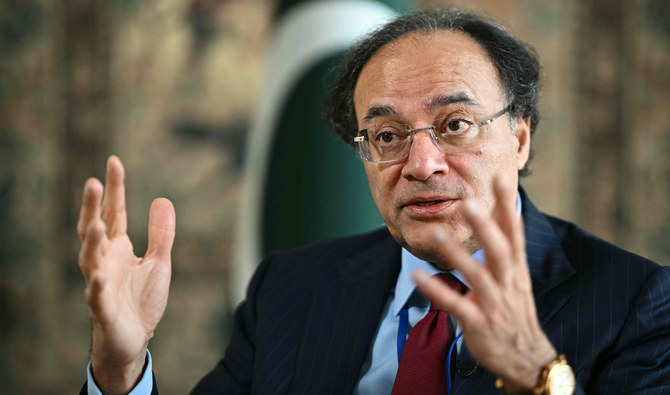
- The quantum and duration of new loan is still not clear, though the government wants at least a three-year program
- Muhammad Aurangzeb says the modalities of the new loan will be thrashed out with an IMF delegation next month
ISLAMABAD: Pakistan’s finance minister Muhammad Aurangzeb said on Tuesday the country planned to discuss the contours of a new loan program with an International Monetary Fund (IMF) delegation next month while hoping to reach a staff-level agreement with the global lender by early July.
Pakistan secured a $3 billion IMF bailout last year to avert a sovereign default and hopes to receive the final tranche later this month. However, the government wants a fresh IMF loan since the country continues to face tough economic challenges and plans to implement structural reforms.
“We are still hoping that we can get into a staff-level agreement by the time June is done or early July so that we can move on,” the finance minister said while addressing a news conference.
He informed he had good discussions with IMF and World Bank officials during the spring meetings held by both international lending organizations in Washington.
Aurangzeb maintained it was not right to say that the IMF was imposing strict conditions on Pakistan since the country needed to carry out reforms on its own to strengthen its economy.
“This is Pakistan’s program which is helped, supported, assisted by the fund,” he said. “This is how we have to see it since this is the way ownership will come.”
He maintained the country’s foreign reserves were increasing and would reach about $10 billion by the end of June this year well before the new IMF program.
“Once the final tranche comes from the IMF, end of this week, we will be over $9 billion,” he told the media. “By the time we end June, we will be anywhere between $9-10 billion, which is going to be equivalent to two months of import cover.”
The finance minister noted the country had made progress since its foreign reserves dipped to nearly $3.4 billion last year.
He said the stock market was also hitting all-time highs and foreign buyers were entering the market.
“The gross domestic product growth is expected to be at 2.6 percent in the current fiscal year,” he said, adding the government was taking steps to attract foreign investment and keep the current account and fiscal deficits within reasonable limits.
“The current account deficit has been reduced to $1 billion after a 74 percent reduction in FY24,” the minister said, adding the inflation was expected to remain at 24 percent during the ongoing fiscal year, while the trade deficit had been reduced to $17 billion following a 24.9 percent decrease.
He said the quantum and duration of the new IMF program was yet not clear, though the government wanted to secure at least a three-year loan package.
Pakistan and IMF have said they are already in discussions for the new loan.
Aurangzeb said structural reforms carried out by the government include increasing the government’s tax revenue-to-GDP ratio to 13 percent to 14 percent in next two or three years from the current level of around 9 percent, reducing losses of state-owned enterprises through their privatization, and better management of the debt-laden energy sector.
With input from Reuters
Pakistan refiners warn $6 bln upgrades at risk due to fuel price deregulation plan
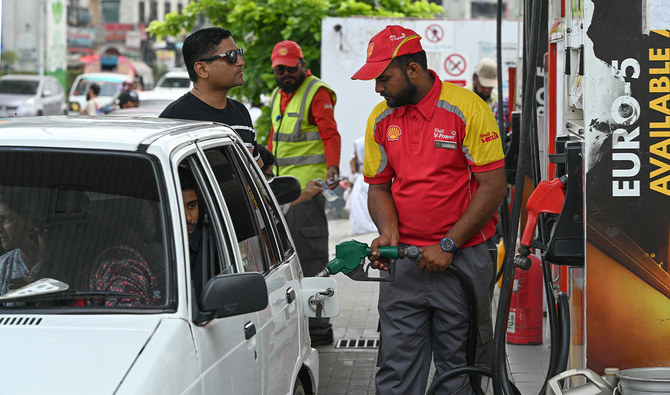
- Regulatory authority proposes oil marketers, refineries be allowed to set prices instead of government
- Refiners demand they be consulted before the implementation of “irrational recommendations”
KARACHI: Pakistan’s plans to deregulate fuel prices could lead refiners to halt planned upgrades worth up to $6 billion and force some refineries to close, some of the country’s top refiners said in a letter to the country’s oil regulator.
Looking to drive down prices for consumers, the South Asian nation’s Oil & Gas Regulatory Authority (OGRA) has proposed that oil marketers and refineries be allowed to set fuel prices, instead of the government setting prices.
As part of the change, OGRA proposed scrapping or reviewing a rule that requires fuel buyers to purchase supply from local refineries, another issue the refiners said could result in “disastrous consequences.”
The refiners — state-run Pakistan Refinery and private domestic refiners Pak Arab Refinery, Attock Refinery, Cinergyco, and National Refinery — said they were already struggling to operate near full capacity and asked that they be consulted before the implementation of “irrational recommendations.”
“The refining sector requires OGRA support through pragmatic and supportive measures, rather than suggesting ways that if implemented would result in their permanent closure,” the refiners told OGRA on Monday in a letter, which was reviewed by Reuters.
The deregulation was aimed at boosting competition and protecting the public interest, OGRA told Reuters in a statement on Tuesday, but did not respond to specific questions on the letter from the refiners. However, it said in an April 17 presentation reviewed by Reuters the potential impact of deregulation on refinery upgrades had to be assessed carefully, calling it a challenge.
“The refineries upgradation will bring in investment of $5 — 6 billion and not only result in cleaner environment friendly fuels but also result in savings of precious foreign exchange of the country,” the refiners wrote in the letter to OGRA.
Pakistan hopes to get new IMF loan by early July, says finance minister
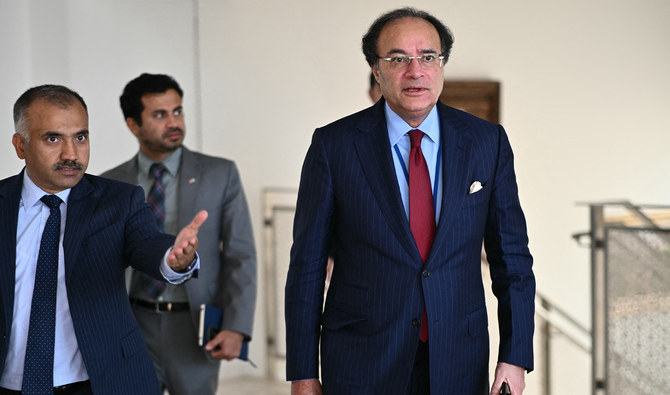
- Pakistan’s current $3 billion financial arrangement with IMF expires in late April
- Islamabad is seeking “bigger,” long-term loan to ensure macroeconomic stability
Pakistan is hoping to reach a staff-level agreement with the International Monetary Fund by June or early July, its finance minister said on Tuesday.
The country’s current $3 billion arrangement with the fund runs out in late-April, which it secured last summer to avert a sovereign default.
Islamabad is seeking a long-term bigger loan to help bring permanence to macroeconomic stability as well as an umbrella under which the country can execute structural reforms.
“We are still hoping that we get a staff-level agreement by June or early July,” Finance Minister Muhammad Aurangzeb told a conference in Islamabad.
He returned from Washington last week after leading a team to attend the IMF and World Bank’s spring meetings. “We had very good discussions in Washington,” he said.
He said he did not know at this stage the volume and tenure of the longer program.










